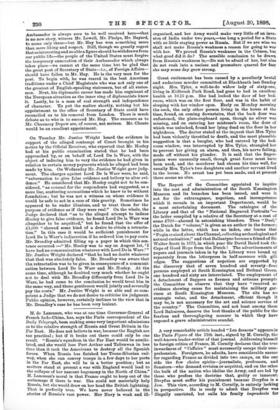M. de Lanessan, who was at one time Governor-General of
French Judo-China, has, says the Paris correspondent of the Daily Telegraph, been making some very important admissions as to the relative strength of Russia and Great Britain in the Far East. He does not believe in war, because the English are too practical ; but if it broke out there could only be one result. "Russia's squadron in the Far East would be annihi- lated, and she would lose Port Arthur and Talienwan in less time than it took the Americans to destroy all the Spanish forces. When Russia has finished her Trans-Siberian rail- way, when she can convey troops in a few days to her ports in the Far East, she will be in a better position ; but as matters stand at present a war with England would lead to the collapse of her nascent hegemony in the North of China." M. Laneasan's moral is that France ought to keep out of the scrimmage if there is war. She could not materially help Russia, but she would draw on her head the British lightning. That is perfectly true. We have never believed in the stories of Russia's vast power. Her Navy is weak and ill-
organised, and her Army would make very little of an inva- sion of India under two years,—too long a period for a State with so little staying power as Russia. But if we are wise we shall not make Russia's weakness a reason for going to war with her. We proved Russia's weakness in the Crimea, but what good did it do ? The sensible conclusion to be drawn from Russia's weakness is,—Do not be afraid of her, but also do not rush into a useless and premature quarrel for fear she may some day grow strong.


































 Previous page
Previous page